|
 |
Newsletter
July 2015
|
|
 |
| |
|
Composting
"It's Just Like Riding a Bike"
What does the statement, "It's just like riding a bicycle" actually mean? That it's easy? Not really. Does it mean that once we have learned something it becomes second nature? I think that's closer to the truth, but it's certainly not the whole story.
Becoming "second nature" belies the fact that learning how to ride a bike was difficult for many of us and took a good deal of practice and patience. Think about what is involved. Riding a bicycle represents a complicated algorithm in our brains, and includes:
|
- Athleticism and balance;
- Downward force on the peddles combined with pulling and pushing on the handlebars;
- Leaning our whole body into a turn;
- The gyroscopic procession in the wheels; and
- A belief that we can do something we've never done before.
|
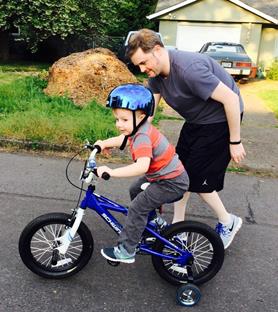
|
|
As we practice, we very slowly get better until suddenly something CLICKS and now we are riding a bicycle as though we've known how to do it forever. At this point, you cannot unlearn how to ride a bicycle.
So how does this relate to composting? Well, composting also represents a complicated algorithm, one that is biologically mediated. It includes:
- A balance of Carbon and Nitrogen in the mix;
- A wide range of particle sizes (small to large);
- A mix-porosity that allows for uniform airflow (bulk density);
- Water (the mix needs to be wet enough but not too wet); and
- Oxygen.
The first pile can be a bit scary - and exciting. You may ask yourself, "Will it actually work, or did I spend all of this time, effort and money for nothing?" When we have prepared the initial mix to be within the target ranges and we turn on the airflow, the pile will get hot and the odors that come off the top of the pile will be mild and (dare I say) pleasant.
And when this happens, something CLICKS and we are now composting as though we've known how to do it all along. At this point, you cannot unlearn how to compost. We marvel at how simple it is and we ask ourselves, "Why haven't we been doing this all along?"
|
Detweiler Homestead Farm
in Sellersville, Pennsylvania
Understanding that organic farming requires healthy soil, Dwight purchased compost from a local composter, Two Particular Acres in Royersford, PA - a client of O2Compost. As he researched organic farming practices, Dwight visited Stone Barns Center for Food and Agriculture in Tarrytown, New York - also an O2Compost client. At both locations, he saw aerated composting at work and the thought occurred to him that producing his own compost on-site should be the next step in his plan.
When asked if the O2Compost Training Program met his objectives, Dwight said, "Properly composted material is key to any organic farm. It's a major component to our soil building/fertility plan, and therefore the O2Compost System most definitely meets my objectives. In addition, I am enjoying learning about the ASP composting method and the staff's support has been timely and very much appreciated!"
Today, Dwight is composting pretty much everything he can get his hands on, including:
|
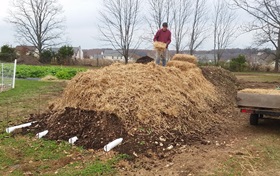 |
- Livestock manure from neighboring farms: horse (wood pellet bedding), cow (straw bedding), and chicken (no bedding);
- Large amounts of chopped leaves in the fall; and
- "Green Manure" grown on site as a cover crop.
|
|
Detweiler Homestead is a 6-acre diversified farm with organic vegetables, small fruits, and ornamental flowers. They sell their produce through their on-site Farm Market as well as to a few local chefs and a wholesale "Local Food Hub" in Philadelphia.
When asked if the O2Compost Training Program met his objectives, Dwight said, "Properly composted material is key to any organic farm. It's a major component to our soil building/fertility plan, and therefore the O2Compost System most definitely meets my objectives. In addition, I am enjoying learning about the ASP composting method and the staff's support has been timely and very much appreciated!"
|
Organic Land Care Put into Practice
A Blog Series by Peter Moon
Back in February, I wrote a brief article on my own application of organic land care practices to rehabilitate my lawn at home. During the early spring, I raised several depressions with washed sand, thatched and aerated the entire lawn, top dressed it with screened horse manure compost, reseeded it, and applied compost tea. I also installed an irrigation system so you may see some remnants of the trenches (it was like a war zone for a couple of weeks).
I am pleased with the results, especially given that my daughter will be getting married at my home later this summer. Here are a few before and mid-July progress pictures that demonstrate the benefits of applying organics in the garden.
|
|
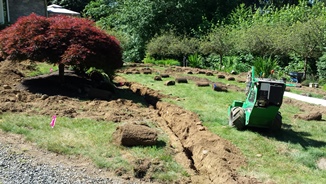
|
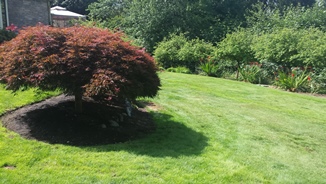 |
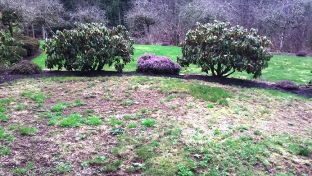 |
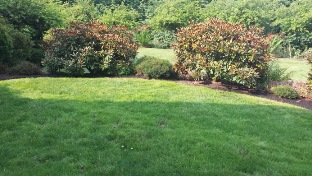 |
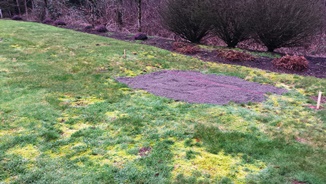 |
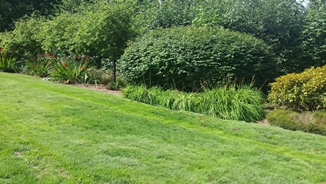 |
Peter's Rules of Composting - A 12-Part Series
Rule 12: Keep It Simple & Systematic (KISS)
Rule 12 is derived from Ockhum's Razor, which states: "Among competing hypothese, the one that makes the fewest assumptions should be selected."
We all know the KISS Principal (Keep it Simple, Stupid). My version of the KISS Principle is Keep it Simple and Systematic.
Keep it Simple: Most engineers say, "If it's not broken, it doesn't have enough bells and whistles". I believe that every compost system should be kept as simple as possible so that anyone can operate it with a minimum amount of training (and without formal training in microbiology). This is my bias.
O2Compost systems use an electric blower that is operated by a simple cycle timer to induce airflow into the pile under positive pressure. Yes, we can incorporate a programmable logic controller that can collect and graphically display temperature data. Yes, we can operate the system using a computer that tells the blower to reverse the airflow from positive to negative aeration based on the temperature differential between the top and bottom of the pile. We can do these things, by why? It only costs more money and these features are prone to fail at the least opportune time.
Keep it Systematic: As I said in Rule 9, "It is important critical to make mistakes." Learning what doesn't work is even more important than figuring out what does work (see Rule 9). Composting is experiential and it is through an ongoing trial and error process that you will learn the most efficient and effective way to operate your compost system (see Rule 2).
To take advantage of your successes (and failures), I recommend that you develop one or more checklists to follow so that critical elements don't get overlooked. This will enable you to produce a high quality finished product - consistently (see Rule 11).
Checklists will also help you transfer the day to day operations of the system to someone else so that you can use your time more productively and perhaps go on vacation from time to time.
The First Corollary of Rule 12: "That which gets measured, gets done."
Reference: The Checklist Manifesto by Atul Gawande, 2009
Previous Rules:
Rule 1 - Start With the End in Mind (April Newsletter)
Rule 2 - To Learn to Compost, One Must Compost (June Newsletter)
Rule 3 - Every Question About Composting Has Only One Answer (July Newsletter)
Rule 4 - Oxygen is the Secret to Composting (August Newsletter)
Rule 5 - Water is the Highway of Life (September Newsletter)
Rule 6 - Composting Takes Time (October Newsletter)
Rule 7 - There Are No Decimal Points in Composting (November Newsletter)
Rule 8 - Thing BIG, Start Small (December Newsletter)
Rule 9 - It is Important Critical to Make Mistakes (January Newsletter)
Rule 10 - Every System Has Constraints (February Newsletter)
Rule 11 - Always Strive to Improve Product Quality (April Newsletter)
|
A New Compost System Comes On-Line |
|
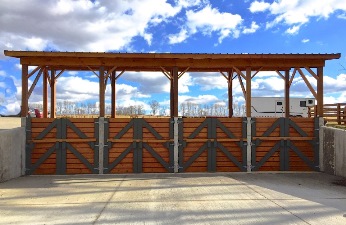
|
OWNERS: Katie & Jim O'Brien
LOCATION: Lexington, Kentucky
20 horses on wood pellet bedding
The finished compost is used around their farm.
This system can also be found on our website.
|
Coming Events
September (TBA)
ASP Hands-On Workshop
- Seattle, Washington
This 3-day event bridges the gap between the classroom and the field.
Email sherri@o2compost.com if you are interested in attending.
More information will be provided in our next newsletter.
October 27-28, 2015
ASP Organic Land Care Workshop
- North Carolina
More information to be provided in our next newsletter.
|
|
Protecting Our Land, Air and Water Resources
|
|
O2Compost
Price-Moon Enterprises, Inc.
PO Box 1026
Snohomish, WA 98291
|
Phone: 360-568-8085
Email: info@o2compost.com
www.o2compost.com
|

|
|
